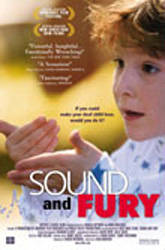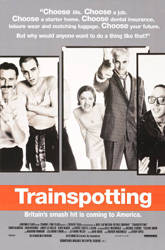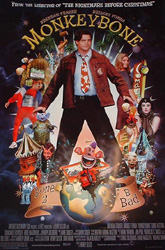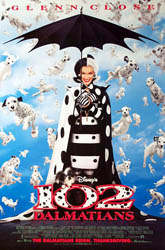Cinema-Scene.com
Volume 3, Number 8
This Week's Reviews: Sound and Fury, Trainspotting,
Monkeybone, 102 Dalmatians.
This Week's Omissions: 3000 Miles to Graceland.
 |
Sound and Fury 
(Dir: Josh Aronson, Appearances by Peter Artinian,
Nita Artinian, Chris Artinian, Mari Artinian, Heather Artinian, Christopher Artinian,
Emily Artinian, Timothy Artinian, Michael Mancini, Nancy Mancini, C.J. Artinian, Lee
Vestrich, Linda Vestrich, Shelby Vestrich, Stanley Hajdamacha, Diane Hajdamacha, and Nancy
Hajdamacha)
more
BY: DAVID PERRY |
Often times we enter films with our minds made up; there is
no question which way we would side on an issue. That is probably the case with most
anyone entering Sound and Fury, but that mind that was so sure is probably
questioning by the end. For most of us, having a child born deaf is horrible and we would
do anything to give them back their hearing. With the advent of cochlear implants, it
seems to us that anyone with a deaf child would hurry to get one.
But what we don't understand as hearing people is that
there is a deaf culture, one that takes a great deal of pride in being deaf and that
actually hope their children will be deaf too so that they might carry on tradition of
being deaf. For them, cochlear implants may be the beginning of the end for their
traditions -- it is like scientific evolution ending a lifestyle instead of strengthening
it.
That is the problem that faces the two families in the
center of Sound and Fury. Two brothers, one deaf, one hearing, have started their
own families and must come to terms with the birth of deaf children. For Chris, the
hearing one, and his wife Mari (who is the only child of two deaf parents), this is
traumatic -- how can they let their baby boy be stigmatized by this handicap? They are
automatically looking into getting cochlear implants for their child.
But for Peter, the deaf one, and his wife Nita (who is also
deaf) having a deaf child is a gracious miracle -- Heather is merely the third in a line
of deaf babies in their family. Now, Heather is four and socializes with the hearing
children that go to her school. When she becomes more and more frustrated with being
unable to hear her friends and learns of the process her aunt and uncle are deliberating
on, she soon decided she too much have a cochlear implant. This is heartbreaking to her
parents, who fear that a hearing Heather will be ashamed of her deaf parents and will look
down on them. Nevertheless, at the bay of Peter's parents and those doctors around them,
Peter and Nita also begin to seek help on getting their child an implant.
Documentarian Josh Aronson does a great job balancing the
issue between the two. Most people seeing this film will have their mind made up before
the first shot but will be left to think perhaps otherwise by the finale. Some deaf groups
have denounced this film, citing that it leans to the hearing -- I disagree a great deal.
If there is any leaning it would be to the deaf, because the hearing are the ones have no
idea of the inner struggle on the issue before hand but are left ambiguous by the end. If
this film had been completely pro-cochlear implants, then I doubt that so many hearing
people would rethink their beliefs by the end.
In a weird little way, this film actually reminded me of
the type of movie Errol Morris would have made. Morris too likes to look at issues with an
open meaning -- he loves to create films on people that would not have a voice otherwise.
What director Aronson does is tantamount in the fact that he brings the deaf culture's
side of the cochlear implant's issue to the fore. Morris has done this before with a pet
cemetery owner, a cosmologist, and an execution device maker.
When Morris made The Thin Blue Line, he brought a
story up that was so important that it literally changed history. Thanks to that film, an
innocent man is now out of prison after 11 years incarceration for allegedly killing a
police officer. In the years to come, we may find the same historical importance from Sound
and Fury -- perhaps thanks to this film, the deaf culture will remain despite the
induction of the cochlear implant.

BUY THIS FILM'S
  
FROM AMAZON.COM |
REVIEWS OF THIS FILM
   |
 |
Trainspotting 
(Dir: Danny Boyle, Starring Ewan McGregor, Ewen
Bremner, Jonny Lee Miller, Kevin McKidd, Robert Carlyle, Kelly Macdonald, Peter Mullan,
James Cosmo, Eileen Nicholas, Susan Vidler, Pauline Lynch, and Shirley Henderson)
more
BY: DAVID PERRY |
Growing up I always remembered that old saying,
"Choose life." What the hell did that mean? I felt like I was stuck in a world
of colloquialisms that were as deep as a fortune cookie. For my money, the real heartfelt
lessons were in Billy Wilder films not in sayings. "Tomorrow is the first day of the
rest of your life" -- pshaw.
But everything must come to make sense someday -- at least
let's hope so. And that is the case with the old 'choose life' dictum. Watching Danny
Boyle's Trainspotting everything makes sense -- that little epitaph meant more
than some new age phrase, it had some meaning. Those portrayed in Trainspotting
are the ones that need to understand choosing life; they are the ones that this phrase was
penned for.
And who are these people living a life less ordinary? They
are addicts in Scotland, living lives that are regulated around getting what they need.
For three of them, heroin is their mode of addiction, for another passivity, and for the
last aggression. They are a madcap quintet -- pissing away lives that could amount to
something.
In the beginning as we are introduced to our humble
narrator Renton (McGregor) we can see that he is on a road to nowhere, stealing CDs from a
shop in hopes of making a little cash to pay for the next hit. His home away from home is
a drug dealer's apartment where he is issued a regular platter of needle, spoon, lighter,
and heroin beside his best mates Sick Boy (Miller) and Spud (Bremner). They are as
troublesome as he is, though Spud is helpless in his addiction while Sick Boy is just
there to compare metaphorical sizes.
The duration of the film is about what drugs do to Renton
and how they cause him to grow as a person. In the first act, we see him steal a camcorder
recording of momma's boy Tommy (McKidd) having sex with his girlfriend, but by the end he
has been through a journey. His great place in life is not freeing the enslaved or
bringing about prosperity, but he does succeed in his place in life. When he does
something that would have been inexcusable in most cases, we are still on his side -- we
too have seen the struggle that he has been through and the evils of Sick Boy and maniacal
Begbie (Carlyle, giving a knock-out performance -- sorry, couldn't resist). We do not
denounce him, but instead embrace him with a soliloquy worthy of a Shakespearean work.
Movies about drug addiction are certainly nothing new, but
this film makes everything look different -- almost like it is the first film to deal with
the subject. Director Danny Boyle creates a melancholy world that looks at times like
Stanley Kubrick's A Clockwork Orange in the form of a Salvador Dali painting. I
did not have a stopwatch, but a feverishly paced sequence depicting Renton's hallucination
while coming off of heroin seems to last foreverthough in retrospect it was at most ten
minutes long. Boyle understands that the creation of something at this magnitude must work
in the editing as much as the stylized direction and he works this perfectly. Editor
Masahiro Hirakubo and Boyle work the material in a way that flies by in the moments of
action and slows down in those of reflection.
But, really, what marks this film is its wicked wit. Few
films over the last few years have been as deviously funny as Trainspotting,
where jokes and in-jokes run abound. For heaven's sake, where else can you find the son of
Bernard Lee, M in the James Bond series during the Connery and early Moore years, spout
out a trivial obsession with Connery and the Bond films. To watch and listen to Jonny Lee
Miller's feelings of Pussy Galore being a misnomer is classic cinema.
Screenwriter John Hodge based this film on the cult novel
by Irvine Welsh. Having never read the novel, I cannot say much for the adaptation's
excellence in coming from the source, but as a screenplay, it is one of the finest from
the 1990's. Hodge captures the essence of these characters through speech and mannerisms
-- giving us characters and moments that are unforgettable.

BUY THIS FILM'S
  
FROM AMAZON.COM |
REVIEWS OF THIS FILM
   |
 |
Monkeybone

(Dir: Henry Selick, Starring Brendan Fraser,
Bridget Fonda, Dave Foley, John Turturro, Whoopi Goldberg, Rose McGowan, Chris Kattan,
Megan Mullally, Giancarlo Esposito, Randall Bosley, Mary Stein, Owen Masterson, Amy
Higgins, and Jason Kravits)
more
BY: DAVID PERRY |
Stu Miley (Fraser) is a cartoonist -- a respected one at
that. But all his success with the devilish character of Monkeybone has come from years of
mental anguish. A long fight with insomnia finally brought him to seeking help from a
sleep institute and the arms of a physician named Julie McElroy (Fonda). Their
relationship stems furthur than simply doctor/patient and the two become lovers. Through
their bonding, Stu loses his nightmares and becomes a happy person again -- Monkeybone is
a growth from his happier side.
Stu is weary of success, even though it is knocking loudly
on his door. When he and Julie attempt to sneak out of a press junket for Monkeybone's
television premier, their car's gas pedal is taken over by an inflating Monkeybone doll
and the motorists crash into a nearby studio. Julie comes out unscathed but Stu goes into
a coma. Immediately, his sister (Mullally) begins work on getting the plug pulled after
the regulated 3 months.
Meanwhile, Stu has been sent to Downtown, the world where
people go during comas and interact with the figments that mark their imaginations. Inside
Downtown, an elfin-like Hypnos (Esposito) rules, giving the best nightmares to the various
inhabitants of Downtown. Nearby is Thanatopolis, where Death (Goldberg) dictates who stays
and who goes.
One inhabitant of this area is Monkeybone (voiced by
Turturro -- how is it that talentless sister Aida gets to be on The Sopranos and
Turturro is left to garbage like this), who serves as the lounge singer in the Downtown
nightclub. He is an annoying, offensive, and irritating. He may be the happy dream of Stu,
but he's closer to my nightmare.
In a plan to get the most nightmares possible, Hypnos has
Monkeybone go back to Stu's body after stealing an exit pass from Death. And now
Monkeybone inhabits Stu's body -- making a fool of Julie, capitalizing on Stu's ability to
sell a product, and attempting to create a plethora of nightmares through Julie's recently
discovered (gasp) nightmare juice. Now Stu must get back to earth to save his body, his
girl, and his fans from the mischief of Monkeybone.
First of all, the film Monkeybone is not a
complete waste, but it is certainly as close as it can get. I respected the film's use of
visuals, especially in the various dream sequences (one Burton-esque sequence is the
film's finest moment). Director Henry Selick has long proven himself as a great of
three-dimensional animation. With both James and the Giant Peach and The
Nightmare Before Christmas he made visually stunning creations straight from the
imagination of a genius. With Monkeybone, he falters more than could ever be expected.
There are moments of Monkeybone as demented as
most horror films and surely fare for the older crowd, but so much of the film plays to a
youthful audience that anyone past the age of potty jokes would feel insulted by it (for
heaven's sake, the lead character is named such only so that his initials can spell
'smiley' on his shirt). I know that by the end, as our hero is dangling from a hot air
balloon and a corpse's entrails are falling to the ground, I was nodding in agony. Monkeybone
has so many fine moments for the imagination that it is more than merely disturbing when
the imagination once creative becomes hindered by stupidity.

BUY THIS FILM'S
  
FROM AMAZON.COM |
REVIEWS OF THIS FILM
   |
 |
102 Dalmatians 
(Dir: Kevin Lima, Starring Glenn Close, Alice
Evans, Ioan McInnerny, Tim McInnerny, Gérard Depardieu, Eric Idle, Ben Crompton, Carol
MacReady, Ian Richardson, Jim Carter, Ron Cook, Timothy West, David Horovitch, and Dick
Brannick)
more
BY: DAVID PERRY |
I remember the old days of Disney -- when Walt considered
sequels to his films being sacrilege. That was then, this is now. Michael Eisner is in
charge now and he couldn't give a damn what his renowned predecessor intended with his
films -- Mike's in it for the bucks, not the art. People wonder why today's Disney gets
such a bad rap: simple, they don't make films like they once did. Entertainment is a mere
hope once they create something that might be commercially viable. When Walt Disney said
he did not want a sequel, most people took heed. I thought that rule would forever go
unbroken.
But my problem with the studio under Eisner is not simply
on his use of sequels despite the denouncement by Walt Disney (he did like the idea of one
franchise -- a Fantasia that would become a work in progress) -- my problem is in his
disregard to what anything that Walt would ever do. I can safely say that there is no
chance the elder Disney would have made a live action version of his animated classics.
This irked me upon the release of a live action 101 Dalmatians -- and it irks me
even more that he had the gall to make a sequel to his live action excursion. Walt is
probably spinning in his grave.
As the new film begins, Cruella De Vil (Close) has been
cooperating with a Dr. Pavlov (nice in-joke, though I seriously doubt that most people
noticed the reference to the man that made dog's salivate with the ringing of a bell --
but, that's beside the point). He has made her a lover of animals now -- a complete
recovery from the evil lady that yearned for a coat made completely out of Dalmatian puppy
pelts.
With this grace of good behavior, she is paroled and given
over to parole officer Chloe (Evans). The problem is that Chloe (a) happens to own a dog
from the litter in 101 Dalmatians and (b) has an office directly beside Big Ben
(Pavlov, bell, get it?). She does not trust Cruella, who is now going by Ella, and
continues to doubt the recovery even as the newfound humanitarian saves a dog shelter from
being evicted.
As fate would have it, Kevin (Sheperd), the owner of that
shelter, falls in love with Chloe and their animals bond (each having their own unusual
pet: him, a parrot that thinks it's a dog, her, a Dalmatian puppy that's depressed because
she was born without spots). They mingle; they mix; they reenact the famous spaghetti
dinner from Lady and the Tramp (woe is me when they remind me of the older, better days).
If this were a relationship that the audience might care about, this would be important.
For 102 Dalmatians (am I the only one that cringes
when thinking of that title), there isn't a classic story to follow, so the screenwriters
get to make everything up -- God, help us. Any secure plot piece in the original is thrown
to the wind in this often-exasperating attempt to scheme a little more cash out of
unsuspecting parents. This film relies much less on precedence from the original and more
on clichés of other films in the genre. Normally being a little manufactured is
pardonable in family films because they have to pander to both the tykes and the parents.
When it becomes uneven, we get the woefully misunderstood The Nightmare Before
Christmas or the painfully cloying The King and I.
I'm going to do my best and refrain from going overboard in
panning this film, there are actually some things that I truly liked. But here's the rub:
everything I liked is dependent on Glenn Close. This is one film that would be a waste of
time if not for a performance far beyond its worth. Close gives a show that could have
been done by Bette Davis or Greta Garbo in their heyday; she is so over the top that the
fun in her moments are able to eclipse the otherwise ghastly film running in between her
scenes.
When Close is on screen, everything is rather rosy. The
sets are gaudily beautiful, the costumes are garishly amusing, and the dialogue is
deliciously evil. Close has an appeal and appearance that makes the film all the better.
Case in point, the normally fine actor Gérard Depardeiu. He is funny in his supporting
role when working in a scene with Close, but alone he is a brutish lug using grunt to get
a couple laughs. He made me smile at times, cringe at others.
As Roger Ebert wrote in his review for the Chicago
Sun-Times, Cruella De Vil is a character too big, extravagant for reality. Within the
confines of animation, she is mesmerizing in the setting of a movie holding its own. When
put on screen in the flesh, she is still big, but too big for the movie to hold its own.
This was a problem with 101 Dalmatians when the story was at least recycled --
for 102, the story is so flimsy and contrived that it doesn't even have a prayer.

BUY THIS FILM'S
  
FROM AMAZON.COM |
REVIEWS OF THIS FILM
   |
Reviews by:
David Perry
©2001, Cinema-Scene.com
http://www.cinema-scene.com






